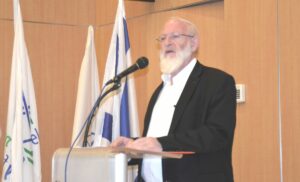THE JOY OF ADAR
By HaRav David Samson

Question:
I know that with the beginning of the month of Adar, a person is supposed to be more joyous. This year, a wave of terrorist attacks have led to the murder of many Jews. Is it appropriate to be joyous in the face of these terrible tragedies?
Answer:
First of all, being happy is a mitzvah that applies all through the year, not just in the month of Adar.
The source of the commandment to be happy is found in the Torah, as it says, “You shall be joyous in every good thing that the L-rd your G-d has given you.”1
King David teaches the importance of joy in the worship of Hashem, “Serve the L-rd with joy; come before Him with singing.”2
Just as joy is essential to the true practice of Judaism, a lack of joy is a grave wrongdoing. The Almighty chastised the Jews because they neglected this factor in their observance of Torah, as it says, “In that you did not serve the L-rd with joy and willingness of heart.”3
Rabbi Nachman of Breslov emphasized the greatness of joy in the service G-d in his famous teaching, “It is a mitzvah to be constantly joyous.”4
It is written about the Arizal (Rabbi Yitzchak Luria) that his incredible wealth of insight into the secrets of Torah came through his joy in the performance of the commandments and in the joy of his learning.5 The Sages taught that a person receives more reward for the joy with which he does the mitzvah, than for the mitzvah itself.6
I remember that after the crash of the disastrous explosion of the Columbia spacecraft, Rabbi Leon Levi of Bnei Brak advised his students not to listen to radio broadcasts for the two days of Rosh Chodesh Adar, the beginning of the month. He feared that the sad news of the tragedy would spoil the special joy of Adar.
Similarly, a few years ago, when two military helicopters collided in the north of Israel, killing 73 Jewish soldiers, just before the beginning of Adar, I asked Rabbi Shlomo Riskin of Efrat whether, owing to the crash, we should be happy or sad during Rosh Chodesh Adar. He answered that in our time, the Jewish People have a constant sadness stamped into our characters over the destruction of the Temple and the exile of the Divine Presence. Therefore, he said, there was no conflict in experiencing both the emotional sadness over the helicopter tragedy and the spiritual joy of Adar’s arrival, as the Rabbis have commanded.
This understanding is congruent with Rabbi Soleveitchik’s perception of the Jewish character, as set forth in his book, “The Lonely Man of Faith.” There he pictures the Jew as a lonely, reflective and serious seeker, in search of his Maker. However, Rabbi Kook writes the opposite, saying that sadness stems from a soul polluted from personal sins and from the general sins of the world.7 Happiness, he maintains, is the normal, healthy state of the Jewish People. If a Jew isn’t happy, then his inner melancholy and darkness need to be brightened through the purifying, joy-filled light of t’shuva. He writes:
“When the light of t’shuva appears, and the desire for goodness beats purely in the heart, a channel of happiness and joy is opened, and the soul is nurtured from a river of delights.”8
As the holiday of Purim approaches, just as Haman’s evil plans were thwarted and turned into a celebration of triumphant joy for the Jews, so may all of our tragedies today be turned into a great salvation of “light, gladness, joy and honor.”9
1.
Deut. 26:11.
2.
Psalms 100:2.
3.
Deut. 28:47.
4.
Likutei Eitzot, Chapter on Simcha, 30
5.
“Lev David,” of the Hida, Ch. 14:3.
6.
Ibid.
- Orot HaT’shuva, 8:12, 14:6-7.
8.
Ibid., 14:6. See, “The Art of T’shuva,” by Rabbi David Samson and Tzvi Fishman, Chapters 1, 7, and 9.
9.
Esther 8:16.






